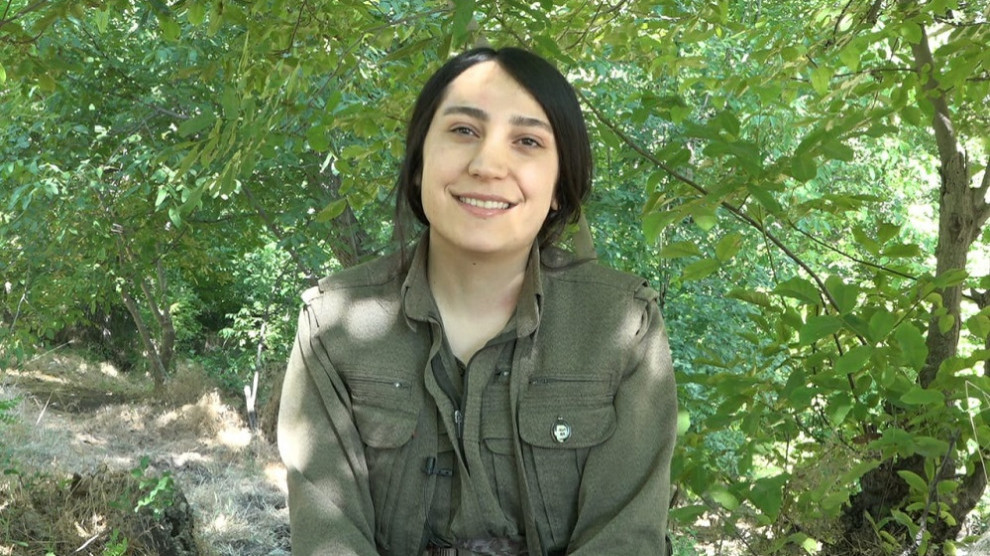Zerya, the spirit of Spartans in Heftanîn
In Heftanîn, Zerya was the woman color of the Spartans. She achieved the most beautiful expression of reaching the the existence of honor with the PKK.
In Heftanîn, Zerya was the woman color of the Spartans. She achieved the most beautiful expression of reaching the the existence of honor with the PKK.

More or less everyone has a grasp of the war methods of the Spartans. Spartans organize themselves according to war, to the military principles of the society and train in that way.
They take boys at the age of six or seven and train them. They learn riding a horse, walking through the fire, walking in the snow, willpower, living in the nature, struggling to survive, enduring hunger, fighting thirst, healing wounds alone, keeping themselves safe, self-reliance, using all kinds of weapons, defending and attacking when necessary. But do you know what is most important? They also know how to sacrifice themselves when it’s necessary. Fighters have maxims and they speak those out before the last bullet is fired. Before the Spartans go to war, they take an oath.
When you leave your home, you will not look back to your house.
When you go to the battlefield, you will not think of your partner, child and bed.
When you get to the battlefield and you join the battle, you will forget yourself!
The most important thing in Sparta is honor!
In Heftanîn, Zerya was the woman color of the Spartans. She achieved the most beautiful expression of reaching the the existence of honor with the PKK. Zerya is the most beautiful name of resistance to the end. Perhaps Zerya Mahir reached the sanctity of drinking immortality by resisting to the end and she flourished in the soil in Heftanîn.
Can you write or talk about someone without knowing or seeing that person? You will always have the fear that it’ll be unfinished. It’s always like this. Everything, everyone is missing, everything was postponed to the period after the war. If you know the PKK, you write, if you know the resistance of the PKK, you write, if your eyes have witnessed the guerrilla's resistance, you write, or if you have listened to the last slogan of a fighter, you write.
If you don't write, you will die. And even if I didn’t know or see her, I would have lived incompletely if I wouldn’t write about Zerya. The poet said: “I was a root in the sleep of the fertile soils, I got wet with your looks before it rained.” And that is how I noticed Zerya during a meeting with a comrade. The comrade said: “We were not with her. We didn’t manage to reach her. She clashed with all the soldiers who were trying to settle on the top of the hill and she ran out of bullets. She killed dozens of soldiers all by herself. She fought alone for freedom, for life.” This is what her comrades told about Zerya.
Derya Çavuşoğlu was born in 1998 in Muş. She joined the PKK at a very young age and came to the mountains, which are the most beautiful expression of freedom. And she came to the area Heftanîn. She learned everything about being a guerilla for the first time in Heftanîn. And the places where you learn the firsts, where you meet the values for the first time, where you inhale the breath of life the first time are more valuable and beautiful in the guerilla.
And Zerya learned everything for the first time in Heftanîn. Heftanîn, which protects and embraces the guerilla, is worthy of the seven colors of nature and one of the most beautiful areas where nature assures its own sovereignty. And Zerya carried the color of such a wonderful geography in her eyes. And she started to look like Heftanîn more and more. She resembled seven colors, not just one color. She didn’t carry just one season on her face, but seven seasons of the nature. And in the most beautiful spring of the seven seasons, she vowed to meet the sun and she mingled with the soil on the hottest day of Heftanîn.
When Zerya Mahir noticed that the invading Turkish army was trying to take over the hill, she fought on the trenches on the hill all by herself and mingled with the soil after killing dozens of soldiers in the area Şeşdara in Cenga Heftanîn in 2020.
It was not Zerya who fell on the soils of Heftanîn; it was a seed that fell on the soil and flourished...
It was not Zerya who shattered on the soils of Heftanîn; it was a stone that united with the soil and settled in the bosom of the soil...
It was not Zerya who fell on the soils of Heftanîn; it was fascism, the cruel face of the millennium!